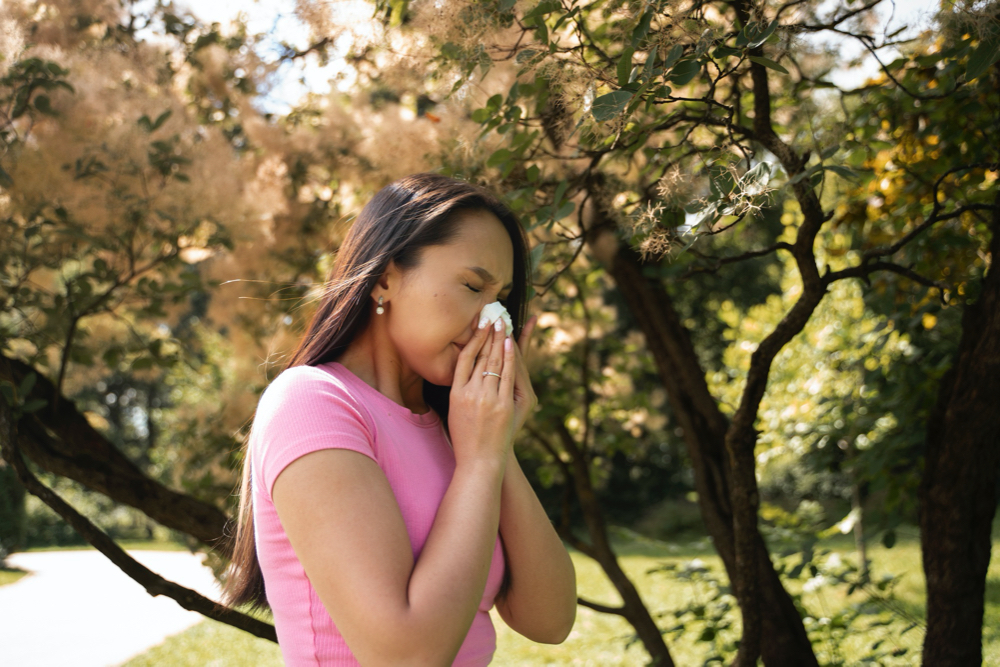- Fast results
- 4,000+ locations
- 4.8 star rating
Need Help? (888) GET LABS



Predicting where the stock market, political elections, or home prices are headed can be tricky business. Just as complex is understanding where our allergies are coming from – and whether they’re getting worse.
Future allergies will be a huge problem if we are not prepared to handle them.
Anyone who has experienced nasal allergies knows how miserable it gets. However, most of us probably don’t think it could get any worse.
We could be wrong about that.
Just as stocks, political sentiments and the housing market can switch in the blink of an eye, so can the root causes of allergies.
It can be just as difficult figuring out what the allergies of the future are going to be.
Fortunately, researchers are making breakthroughs on finding effective treatments for allergies.
Personalabs is here to help. We have numerous allergen blood tests that can help your allergy suffering by figuring out what’s triggering your reactions. It could be trees, ragweed, grass, mold, animals, food or dust.
And we have years of experience testing allergens.
Allergies can make our daily lives miserable. Sneezing, watery eyes, and runny noses are annoying, as we struggle with rhinitis, hay fever, or worse.
Because there’s a possibility that allergy season could be longer, tests and treatments must keep this in mind.
When considering future allergies, climate change is an area to study.
Researchers believe warmer temperatures and increased carbon dioxide levels may be extending the spring allergy season.
Their concern is that as temperatures continue to rise, with longer stretches of warmer weather, the result will be increased pollen counts and a prolonged allergy season for the foreseeable future.
Increased carbon dioxide in the air could result in plants becoming more efficient at producing pollen, and for nasal allergy sufferers in the spring, that means the pollen from blooming trees will be a continuous headache.
In 2010, the National Wildlife Federation released a report warning that “unchecked global warming” would have a severe impact on respiratory allergies, with an increase in airborne allergens and asthma attacks. Researchers now think that warning is proving to be correct.

Predicting what might happen with future allergies means understanding future technology with food.
Researchers are also getting innovative when it comes to treating allergies.
For example, it isn’t just ragweed or pollen that can drive many us nuts in the spring. Some of us also suffer from food allergies. And researchers are now looking at a food allergy that millions suffer from.
The Food Allergy Outcomes Research Program at Northwestern Medicine in Chicago has been conducting research to help relieve the suffering of people with peanut allergies. Specifically, they’re looking at whether it’s possible to prevent children from developing these potentially lifelong allergies.
In fact, recent research has suggested that children can potentially avoid developing an allergy to peanuts by, of all things, eating rather than avoiding peanuts. Studies have found that eating peanuts from infancy could help reduce the risk of an allergy. Even feeding a thin amount of peanut butter to an infant can help, they noted.
Researchers are also looking at where the peanut allergy can be neutralized in the future. They have found two allergy-inducing proteins in peanuts and are trying to determine that if they can lessen their amounts. The result could be the creation of a peanut that’s safe for anyone to eat.
Handling food allergies is a challenge, but solutions are popping up in unique ways. Government officials in Montgomery County, Maryland, just approved an ordinance requiring all restaurant shifts to have at least one allergy safety-trained employee on staff.
With the rules going into effect on July 1, the Montgomery County Department of Health and Human Services is hoping to assist area restaurants by providing a list of online and in-person food allergy training courses that workers can take.
Montgomery County officials noted that roughly 30 percent of adults and 40 percent of youngsters today are affected by allergies. The risk of a possible adverse reaction to a meal isn’t a minor concern.
People can suffer twice when they learn that they’re allergic to cats or dogs. When they get the allergic reaction, then face the prospect of giving up a beloved pet and member of the family, they really suffer.
People, who are allergic to pet dander, are not encouraged to get rid of their pets. Finding allergy relief at the source is the better solution.
Just like with mold or pollen, pet dander — those microscopic bits of skin and saliva residue — can circulate in the air, leading to symptoms like nasal congestion, sneezing, runny nose, and itchy, watery eyes.
Researchers are taking the concepts of pet allergies in a new direction because of new information.
A new study by the University of Alberta found that babies from families with pets, mainly dogs, were showing higher levels of two types of microbes. These microbes are associated with lower risks of allergic disease.
Their conclusion: children who grow up with dogs have lower asthma rates.
What they’re finding is that dirt and bacteria on the dog’s fur and paws can actually help a child build up an early immunity. With this information, the pharmaceutical industry could eventually create a kind of “dog pill” – a supplement of these microbiomes to help those with pet allergies.
If the “dog pill” is a success, the technology can be applied to future allergies.
That’s where allergy testing becomes the ideal solution.
Personalabs is here to help you determine what it is that’s causing your allergic reactions. We are preparing for all future allergies. We have allergen blood tests that can determine a wide range of possible allergies. These include stinging insects, mold, fruit, fish, citrus, and pets, among others. We have blood test for food allergies, and experience testing allergies in many categories. If you live in Florida, we also have tests for allergens that are particularly prevalent here.
With environmental factors potentially increasing allergy seasons for so many of us, and with technology making advances on the treatment, there has never been a better time to end your suffering by finding out what’s causing you to wake up in the morning to the misery of an allergic reaction.

© Copyright 2025 Personalabs. All Rights Reserved.